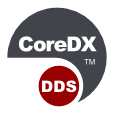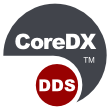February CoreDX DDS Connection
 |
Phone: 720.733.7906 Fax:866.725.4485 230 Third Street, Suite 260 Castle Rock, CO 80104 contact@twinoakscomputing.com www.twinoakscomputing.com |
 |
February CoreDX DDS Connection 2025 Welcome to the Twin Oaks Computing, Inc Newsletter! Our monthly newsletter brings you news and information about Twin Oaks Computing and our CoreDX DDS middleware. Be sure to "like", "follow" and "friend" us on our Social Networking sites for fun facts, free giveaways, and stories about Communications Middleware, Technology, and Twin Oaks Computing. Now Scheduling 2025 Client Visits Does your team have DDS related questions? Are they interested in learning about the newest features in recent and upcoming CoreDX DDS releases? Let us come to you! Twin Oaks Computing is now scheduling client visits for 2025. Agendas are tailored specifically for your team and may include DDS introductions for new team members, Q&A sessions for developers and architects, and/or discussions on new and upcoming features. If your group would like to learn what's new with CoreDX DDS, including enhancements and features, or would like an introduction to CoreDX DDS to see what it can do for you, please contact us. CoreDX DDS Tips & Tricks Welcome to this month's edition of CoreDX DDS Tips & Tricks, where our engineers provide quick bits of information to help our customers. How Using or Not Using DDS Keys Impacts QoS Behavior DDS organizes samples in DataWriter and DataReader caches using instances. Data types that do not have a key result in samples belonging to the same (exactly 1) instance. Data types that define a key will result in as many instances as possible key values. Some QoS policies operate on instances, and may behave differently depending on the number of instances available. For example, a History.depth of "2" will keep up to 2 samples in each instance. With a non-keyed data type, this is a total of 2 samples. With a keyed data type, this is 2 samples for each unique key value. Other QoS policies that operate on instances include Deadline, Ownership, and Time Based Filter. Additional information on these QoS policies can be found in Chapter 12 (QoS Features) of the CoreDX DDS Programmer's Guide. CoreDX DDS Tips & Tricks are intended to be useful for engineers using CoreDX DDS. If you have any questions, please contact us. Try the full-featured CoreDX DDS product free for 30 days Check out the newest DDS standardized features and get your hands on the leading small footprint Data Distribution Service implementation to see what it can do for you. CoreDX DDS v5 continues to focus on resources and performance while incorporating new features and enhancements. Our evaluation copies include the full DDS API and standardized wire protocol, including:
With these enhanced features, CoreDX DDS is the perfect middleware solution to meet the challenges of today's Industrial Internet of Things (IIoT) systems. Learn more here. The evaluation is available here for direct download for the most common platforms, including Linux, MacOS, and Windows. Download your free 30 day trial of CoreDX DDS here. Upcoming Events March 17-21, 2025: OMG Technical Meeting, Reston, VA, USA June 19-13, 2025: OMG Technical Meeting, Location TBD September 15-19, 2025: OMG Technical Meeting, Leeds, UK December 1-5, 2025: I/ITSEC, Orlando, FL, USA December 8-12, 2025: OMG Technical Meeting, San Francisco, CA, USA
|







